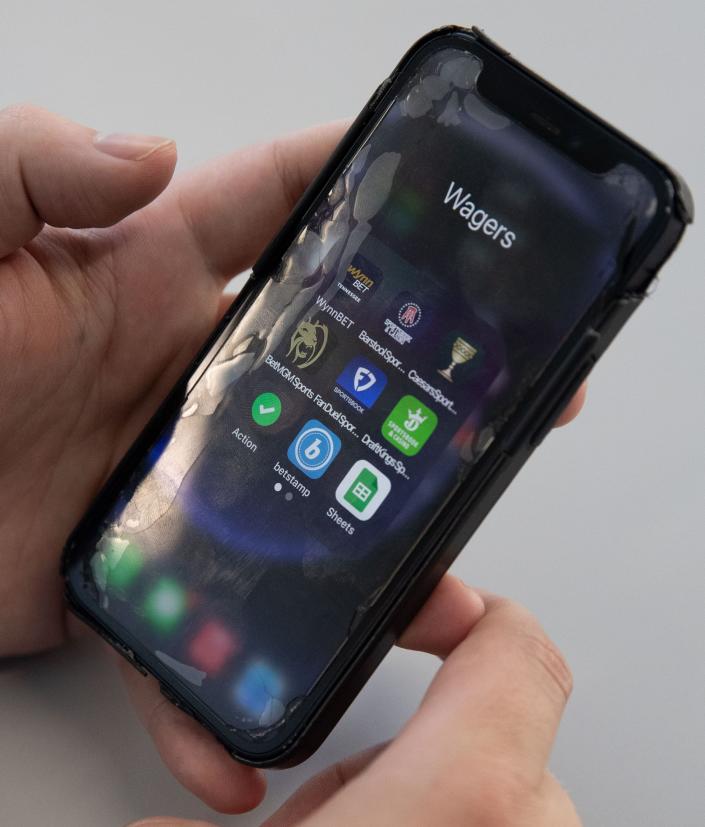For college athletes, gambling on the outcome of sporting events is a violation of NCAA rules. But official statements in the wake of the revelation that dozens of Iowa State and University of Iowa athletes are under criminal investigation suggest that for some, there could be legal consequences as well.
In a statement Monday, the University of Iowa said it was notified May 2 of “potential criminal conduct related to sports wagering that also suggested possible NCAA violations.” The Iowa Division of Criminal Investigation confirmed Tuesday it is “involved in an ongoing investigation concerning potential criminal violations related to sports wagering, including individuals affiliated with the University of Iowa and Iowa State University.”
No charges have been filed, according to the DCI, and no officials have identified the laws they believe may have been broken.

More: Everything to know on the NCAA’s sports betting stance, potential punishments and more
There is a lengthy history of college athletics betting scandals resulting in criminal charges. In one example, two starters on the 1994-95 Northwestern University Wildcats basketball team spent time in prison after pleading guilty to conspiracy to commit sports bribery. The players admitted to accepting money to “shave points,” intentionally underperforming to ensure their team did not cover the spread in predetermined games.
But more recently, and especially in the five years since the U.S. Supreme Court cleared the way for states including Iowa to legalize sports wagering, there have been no college sports gambling scandals resulting in criminal charges, said Andrew Brandt, executive director for Villanova University’s Center for the Study of Sports Law.
“That’s why this case has drawn a lot of (attention),” Brandt said. “I’m just not aware of anything criminal in recent memory.”
Regulator: Integrity of betting markets not compromised
Among the most serious potential criminal offenses would be any allegations that students took bribes or rigged games to achieve gambling outcomes, said Keith Miller, a Drake University law professor and co-author of a textbook on gambling law.
“If there is any indication that there is any corruption involved ― and I really hope it isn’t, because it would be really bad for the universities and for the state ― then the criminal consequences of that are really serious,” potentially including federal charges, Miller said.
The news of the Iowa investigations comes less than a week after the University of Alabama fired its baseball coach over allegations he was involved in “suspicious wagering activity” detected by Ohio gambling regulators. It resulted in an emergency order by Ohio regulators for sportsbooks to halt betting on Friday’s Alabama-Louisiana State University baseball game.
Iowa gambling regulators say they do not see any similar signs of anomalous betting activity around Iowa and Iowa State games.
“We currently do not have any indication that there are any issues that would raise doubt on the integrity of the markets that have been offered from those two universities,” Brian Ohorilko, administrator of Iowa Racing & Gaming Commission, told the Des Moines Register.
“I’ve been getting a lot of questions with regards to the Alabama and LSU situation. We received a number of integrity reports related to that market,” he said. “That has not been the case, at all, through any of the markets that have been offered on these two universities.”
Another potential charge: Underage gambling
Another possible violation would involve Iowa’s minimum age to gamble, which is 21.
University of Iowa officials say they have “received information” about 111 individuals, including 26 current athletes and one athletic employee. The remainder are former athletes, student staffers or people unconnected to the programs. Iowa State has said “approximately 15” of its student athletes may have violated NCAA rules.
If any of those individuals are underage, it could result in legal consequences, but more likely for the sportsbooks that took bets than for the bettors themselves, Miller said.
“It’s really not the 19-year-old who’s going to have criminal consequences… but the sportsbook, the operator that’s licensed under Iowa law,” he said.
Miller said the most serious consequences for sportsbooks taking wagers from underage gamblers would likely take the form of major fines and possible suspension or nonrenewal of their gaming license. But he said he is skeptical that a criminal case would be limited to underage betting.
“If you have sources that say, ‘Yeah, there’s a criminal investigation going on,’ then that means that there is something more than just, ‘Oh, God, we shouldn’t have taken bets from those guys,'” he said.
Brandt pointed out that many of the student-athletes reportedly involved play sports that are currently out of season, such as football, meaning they wouldn’t be able to gamble or take money for their own games if they wanted to.
“It may just be betting on sports contests, like pro basketball or whatever,” he said. “But then you wonder about the ‘criminal’ word. To me, that doesn’t sound like criminals.”
Experts: Gambling scandals only a matter of time
Brandt said it’s not surprising that the explosive growth of sports betting in recent years would eventually show up on college campuses.
“The college side you would think would be much more susceptible to this” than professional athletes, he said. “One obvious reason is these players don’t make money.”
Miller agreed that it’s easy to see how college students might find themselves making poor decisions about gambling.
These are “the sort of things that people had to have anticipated was going to happen,” he said. “It’s easy to bet and set up these online accounts. There’s not that much stigma attached to it. And they’re young men who are very interested in sports, and see betting as just being kind of a natural outgrowth of their interest.”
William Morris covers courts for the Des Moines Register. He can be contacted at [email protected], 715-573-8166 or on Twitter at @DMRMorris.
This article originally appeared on Des Moines Register: What criminal charges could Iowa, ISU athlete gambling probe involve?
